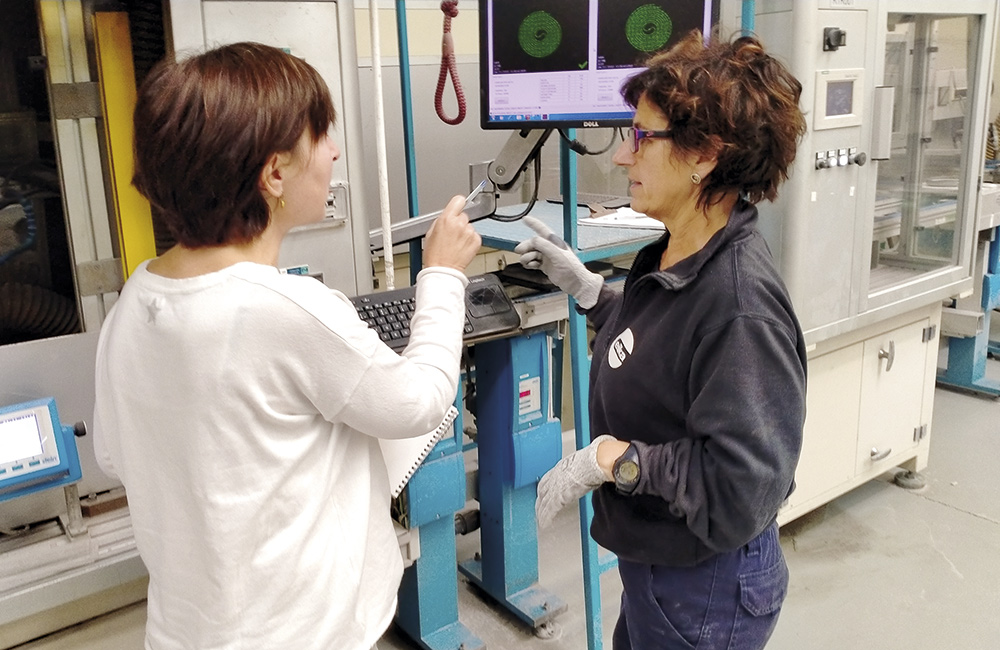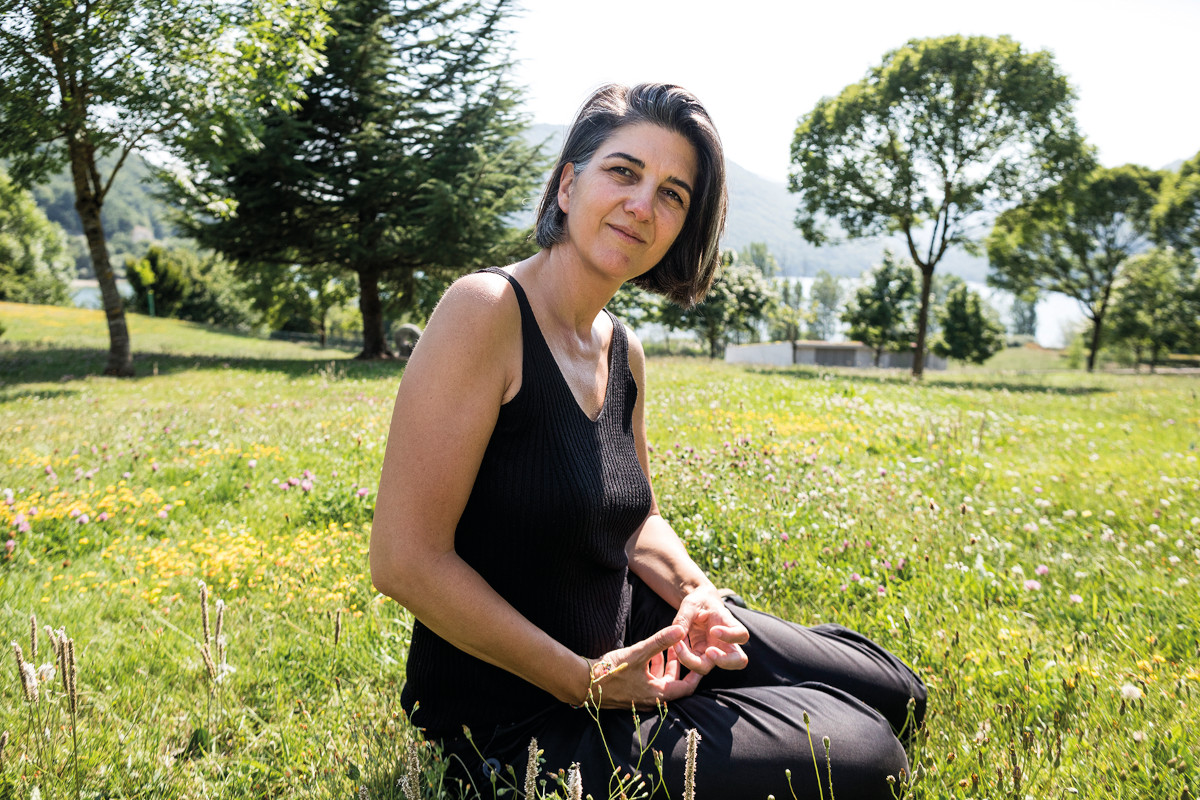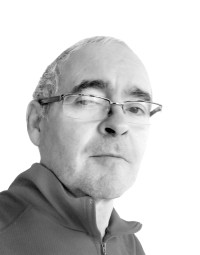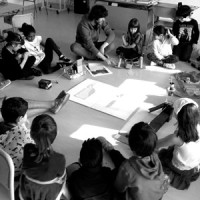"Child participation cannot be seated and only through the word."
- What structures do we need in the village for boys and girls to participate in the decisions of the people or to know how to channel them if they have any need? By pulling the question, they have conducted a pilot experience in four localities and the result has been different in the four. Maite Azpiazu Errazkin, a member of the Oinherri Network of Educators and Educators who has led the process, has given us the explanations.
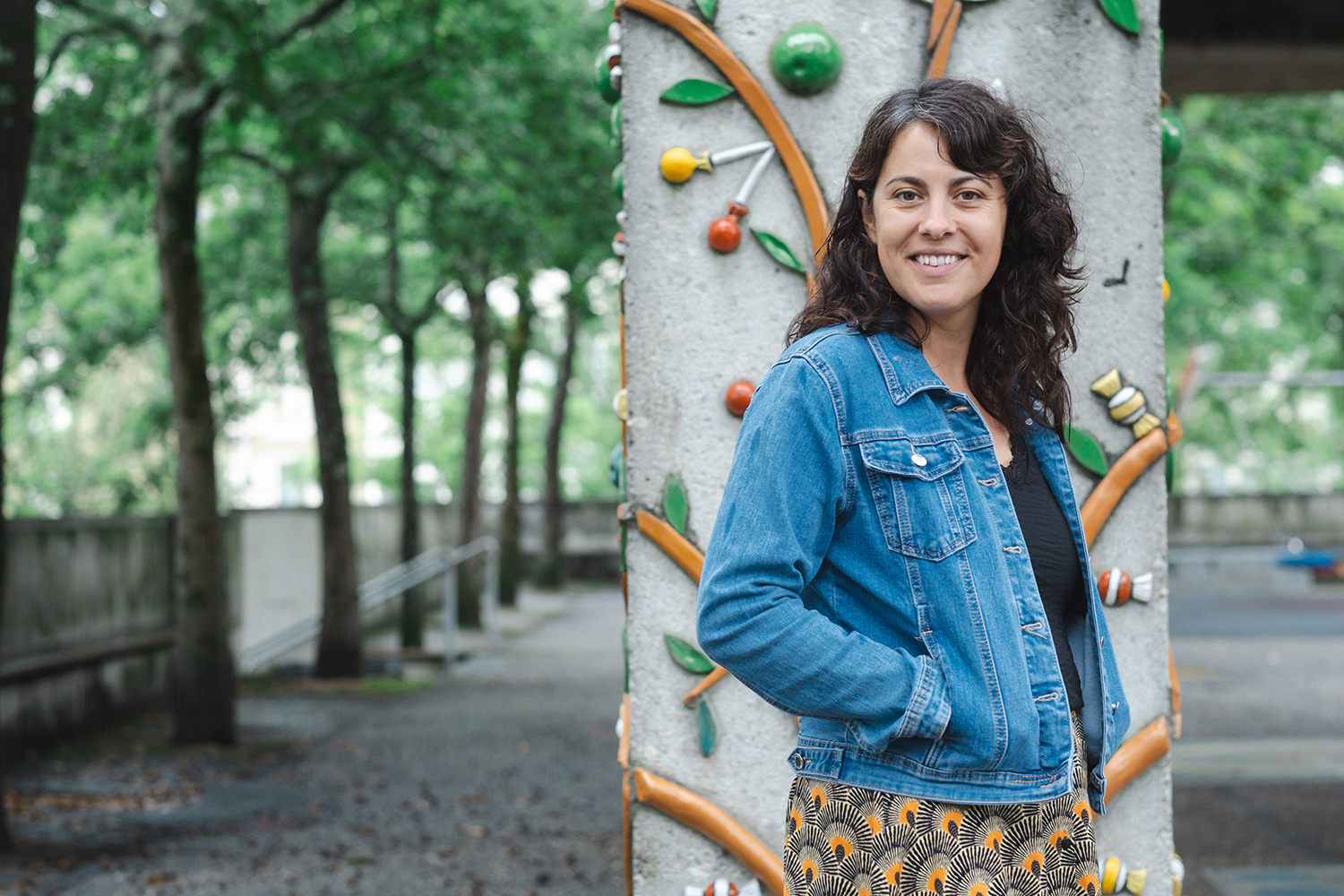
Ask children and young people what they want and go with the list to town hall or anywhere else. Is this how we often understand participation? Isn't it more complex?
Yes, we have greatly simplified the concept of participation, and when we take it to children it is even more obvious. The participation of boys and girls in something is, in general, one of the actions that we have prepared adults is for boys and girls to consume. In cases where there has been a desire to go beyond that, we have come to hear the opinion of the boys and girls, with the question “what do you want?”, but of course, when you ask us this, we get a written letter to Olentzero. If you asked me what I want, without more work, to know what I'm going to throw at it. Then the list comes to the City Hall, the City Hall decides what and what not to reach and they set it in motion. It's a pretty caring model: we give them the floor, but then we end up doing what we want. What we usually do is called social participation: inform and listen to the children, and we almost always ask them about the children's issues, about the courtyards and parks of the school, following the forms of participation of adults, in the form of meetings or assemblies, sitting and with the word.
In the piloting we have made a simple exercise: each one has counted his first participatory memory, with which he associates this participation, and the feeling of belonging, the ability to decide, the self-organization, the right, the group… All this is not taken into account in the participatory processes. Therefore, from social participation we must go in search of a protagonist participation: helping children to identify their needs, “teaching” them to self-organize, to manage the process, to evaluate, to introduce improvements… so that they acquire awareness as an empowering and collective process.
As you say, the participation of children (assembly and word) has been channelled from the perspective of adults. Have you experienced forms of participation closer to children's culture?
We have dedicated a large space to piloting to analyze what is the culture of childhood, its characteristics. We have all been children, immediately the game, movement, socialization, friends, freedom, risk, pleasure, nature, wetting, wetting… If we have to make a process of participation with children, our work tools have to be those, and there we are not sitting or participating with the word. After all, language is the last developed by the child, we are asking for a great effort to bring to words all his thought, when he does not control that path of communication so much. Thus, we have searched for other kinds of expressions: theater, role-playing games, models, play, construction, drawings, sculpture... In addition, these forms of participation are also interesting for adults in a meeting where there are many people, and depending on the subject, perhaps because I myself do not dare to take the floor, but if we expand the methodology of participation, we can feel more comfortable.
One example: In Garaion Sorgingunea, Álava, they design participatory freight structures with boys and girls. Starting from the drawings of each child, they agree on the structure they want to do with the wicker and plant it, then they water and care, once they grow they learn to prune… The goal of participation is not to be something specific, but to create a culture of participation.
"We've gone from talking about childhood to talking about childhood, and we've always taken into account that in order to reach marginal ages, we have to make a special effort, because if not, only come those who encourage families."
And to internalize that culture, how do you learn to participate since childhood?
We say that educating the child in participation is a path that goes from intimacy to the common. The first participation begins in the family, in a domestic environment, where the first construction of the “self” of the personality occurs. If you respect the rhythms of the child, sleep, food… or not, growth can be more authoritarian or more participative. The school would be the second participatory framework, from the “I” to the “we” the child is in a group, where the school can also be more participative or authoritarian. And the third area of participation would be the people: as part of the community, the goal is for boys and girls to be an active part of that community to meet their collective needs, on the one hand, and to transform the country from that little childhood, on the other.
Should the participation of children in local decisions be channelled by the City Hall?
For us, one of the keys to this process has been that municipalities do not involve themselves, because if not, we limit the relationship between the child-a, the City Hall or the family-institution. This relationship is very much worked out by Tonucci [the Italian author and pedagogue of the book The City of Children] and proposes the Children's Council, in which the institutions go to children to hear their opinion. But the community goes beyond the town hall, the community closest to a child is made up of other actors, and in the platoon we have opted for a representation of that community: the municipal community, that of the educational centers and associations of parents of the different formal education networks, and that of non-formal education (of the local free time associations). We have all thought about how boys and girls can influence the local level.
In this teaching process, what role does the adult play not to contaminate too much in the opinions and decisions of children, but at the same time not leave everything free?
Balance is important, but adults have a lot to unlearn, if you look at what we engage in every day, maybe we don't get a long list. That is, even if they are older, ours is no better. Another point that has emerged in the plateaus has been the importance of the limits: participation cannot be free, ask what we want and list the pool, the aquarium and others. Participation has limits, because living in community has limits, and we are not just talking about economic limits, there are educational, ecological, ethical limits…
On the other hand, when we talk about child participation, one of the keys is where the need arises: if the city council wants to transform a park, the need is not for the children, it is for the city council, the participation process is designed to obtain a result and there is little room to bring it to the moulds and times of the children. On the contrary, if the theme arises from the children who want to work, the process has another weight, and there is a need to agree well the role that the adult will play, so that it is not the protagonist (“your ideas I will channel them now”): if the presence of adults, but without generating dependencies.
"One of the keys is where the need came from, where it came from. If you want to work out the children, the process has another weight and you have to agree well on the role that the adult is going to play"
Beyond childhood and youth, and beyond these misguided interventions, what place does citizen participation have in society at a time when everything is so institutionalized, delegated and individualized?
We have moved from living in a very communal way to delegating a great deal to the institutions. Many of the things that we achieved through our participation are now done by the institutions, with a salary. But institutions have limitations to make this participation real, to make it more loose and free; therefore, although institutions are important in the participatory process, they cannot assume the leadership, they should have a facilitating role to give way and resources to what is being created. The City Hall will make it easier, but there will be a community, a group of citizens behind it, who has felt a need and who has activated it. And I believe that in this country we still have a lot of that; in small towns, for example, which have few resources, the popular construction brings forth parties, associations and cultural groups and others. We have our own way of organizing and participating. Otherwise, institutions use participation to legitimize their decisions: “We’ve asked, we’ve received it and we’ve done it, this is what the people want.” But we know who is involved in these kinds of processes and who is left out, what difficulties the institution has in reaching different voices of the people. The institutions should be attentive to the small fires and the initiatives that are taking place in the peoples, in order to structure the dynamics of participation from the bottom to the top.
In four villages, you have conducted a pilot experience, from November to March.
What structures do we need in the people so that boys and girls get used to the culture of participation, get trained, participate in the decisions of the people or know how to channel them if they have any need? In four locations, we have dedicated the course to designing a permanent channel for child participation that the next course will be launched. We chose Hernani, Oiartzun, Segura e Itziar (the four in Gipuzkoa, because it has been subsidized by the Provincial Council of Gipuzkoa), and in each we created a working group consisting of representatives of the city council, of the formal and non-formal education of the locality. We are struck by the illusion that the subject has aroused: we have met every month and our colleagues have stayed from beginning to end, from responsibility and with enthusiasm.
Our hypothesis was that this permanent channel of child participation would take on a different place in place, and so it has been. Then I will explain the way it has taken in each of them. What we have designed is nothing more than a starting point, a pretext for starting to bring children together, and it will be as flexible as possible, what children themselves will change and transform, because otherwise we are again designing adults for boys and girls.
In this process, it has been interesting to go from talking about childhood to talking about childhood, because at the end of the day childhood is another stage of life that goes through another multitude of variables (gender, social class, family models, disabilities…), and we have always taken into account that in order to reach those marginal ages we have to make a special effort, because otherwise only those who are customary or those who encourage families come.
We've also realized that it's hard to experiment, that we're not used to. We know that theory is what we have to value and not the result… but from the third session we will see what nervousness, because no obvious results were seen. In addition, the difference between utopia and reality must be managed: we were clear about what we wanted, but something else is what we can. And keeping that balance has been as difficult as it is interesting.
In addition, we lack models on this issue. We have sought, but it is very little done, the Tonucci Children's Council and the Unicef model, in which municipal technicians enter schools, from there little more, we have hardly any handles to inspire or copy. We lack experience and everything is yet to be done.
"The City Hall will facilitate participation, but that there is a community, a group of citizens behind it, that has felt a need and that has activated it"
What form have the participation channels designed for children and young people taken in each village?
In Segura we will start the course that comes in the gazteleku. Once a month we let Elementary School boys and girls in, and the idea is to bring them something they want, like a movie, start talking and forming a group of boys and girls, which is a space to debate their needs and what they want to change in the village. In Itziar, they will take all of Primary Education (30 children) and once a month they will start working with the free time group Burugorri Martxan from the Itziar project, one of the dreams. In Hernani, it will be performed within the school hours, but outside the center: there will be a representation of the children (because there are many) and some tasks will be taken to class. The Ereñotzu district of Hernani decided to carry out its own process next year, starting from the autumn and spring missions, to address the issues chosen by children during leisure time. Finally, at Oiartzun, they decided to stop at a moment in the process and the next course they did with the children themselves to create the structure with them.
In the course of 2024-25 it will be a challenge to implement the designed projects with the children themselves. It will also be important to train educators and educators, we have thought about creating inter-municipal forums for sharing. And let us not forget that in some villages they have or are setting up children's committees: Azpeitia, Zumaia, Durango, Baztan, Lesaka… We will collect all that knowledge, we have also prepared tools and methodologies for observation and we will experiment.
The UPV/EHU will turn its research process into new research. What does it mean?
It's been a great gift. All the work done by the research group of Auzolana Education of the UPV/EHU will make it a line of research and will serve to put a framework, an argumentation, an opportunity for formation and dissemination to all that we are doing from Oinkari intuitively. We would like to create a tool for any people who want to deepen the participation of children.
In addition, the Basque Government has just adopted the Law on Children and Adolescents and retains its right to participate in it.
It can be useful, but as always, as the law says, if you don't put resources, it doesn't go anywhere. And at the same time, if this view is not in the city hall, in the school, in the community, if it's not internalized that boys and girls have the right to participate since childhood now and here, it's useless.

Hezkuntzaren ardura konpartitua dela eta familiaz eta eskolaz harago herria bera eremu hezitzailea dela, herritarrak hezitzaile ere badirela ulertzen du Herri Hezitzaileen Sareak. Otxandiok (irudian) bat egin berri du sarearekin eta dagoeneko 36 herri direla jakinarazi dute.
Congratulations to the Durangarras who have had the opportunity to express their opinion on an inherited urban megaproject in urban matters. Not a few people have been encouraged to participate in the organised consultation, given the policy that some political parties are... [+]
On September 23, 2020 we participated in the Auzogune del Casco Viejo. The neighborhood is the space for participation proposed by the City of Vitoria-Gasteiz, where citizens, municipal technicians, associations and politicians exchange opinions. The first item on the agenda... [+]












